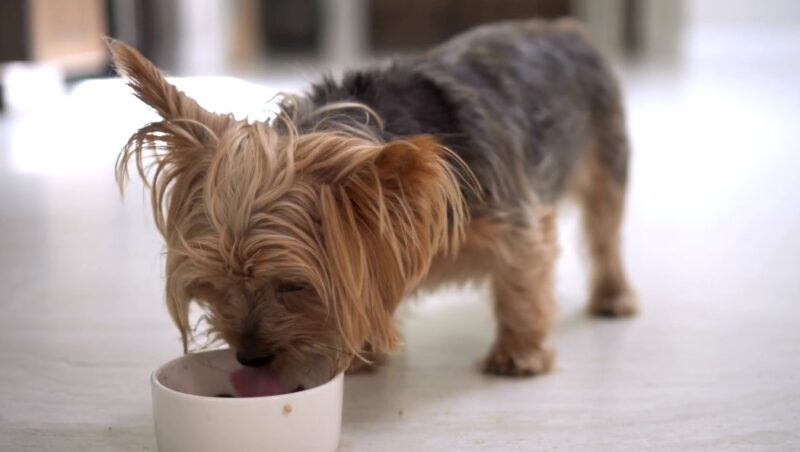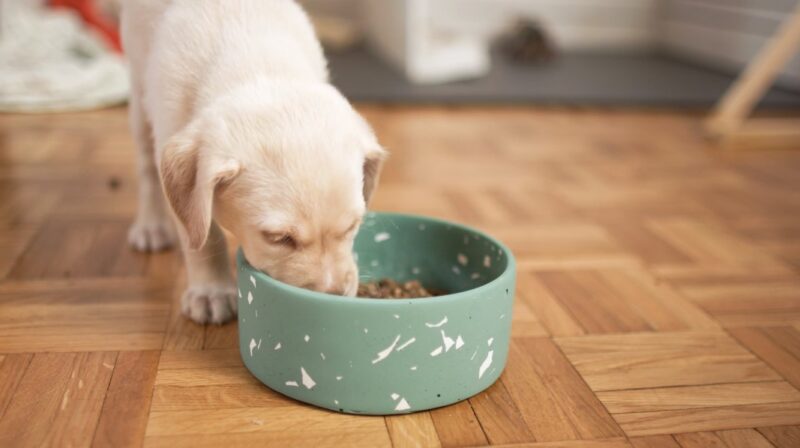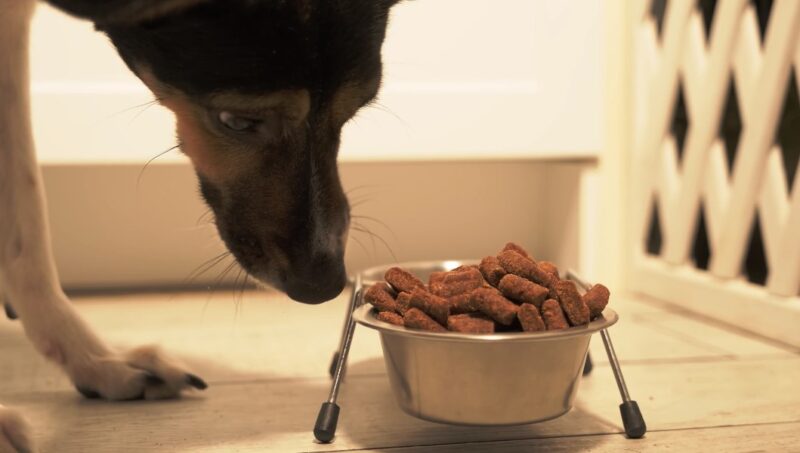The digestive health of dogs is a complex system designed to break down food and absorb nutrients efficiently. When undigested food appears in their poop, it may signal various issues, from the benign to the more serious. This article discovers the reasons behind undigested rice in a dog’s poop, exploring dietary considerations, potential health implications, and when to seek veterinary advice.
Key Takeaways:
- Undigested rice in your dog’s poop often suggests rapid digestion or grain intolerance, warranting a vet check if frequent.
- It may signal digestion issues or dietary incompatibility, meriting a consultation with your vet.
Canine Digestive System
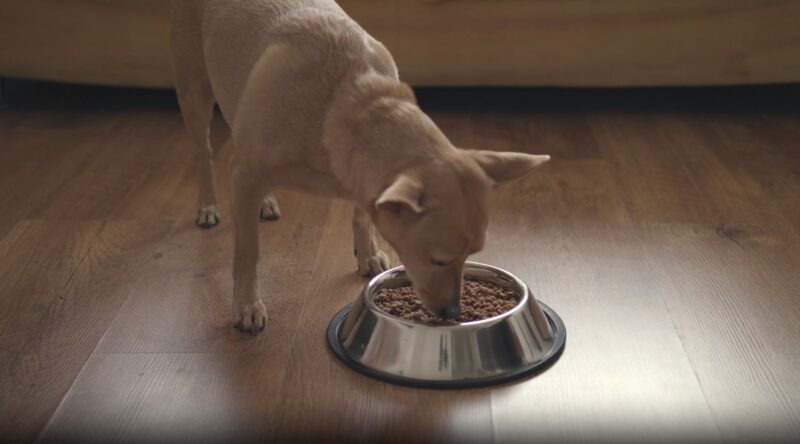
The canine digestive system is designed to efficiently process a wide variety of foods into the essential nutrients needed for energy, growth, and repair. Beginning at the mouth, where enzymes in saliva start breaking down food, the process continues as the food travels down the esophagus into the stomach.
Here, powerful acids and enzymes work together to further break down the food into a semi-liquid form. This mixture then enters the intestines, where the bulk of nutrient absorption occurs. The walls of the intestines are lined with tiny, finger-like projections called villi, which increase the surface area for absorption, allowing vitamins, minerals, proteins, fats, and carbohydrates to enter the bloodstream.
What remains, the indigestible parts of the food, move into the colon, where water is reabsorbed, and the final waste product is formed into stool to be eliminated. This intricate process ensures that dogs receive the necessary nutrients from their diet while efficiently disposing of waste, highlighting the critical role of the digestive system in maintaining overall health.
Why Rice Might Be Undigested in Dog’s Stool?
Rice might appear undigested in a dog’s stool for several reasons, which can vary based on the dog’s health, diet, and digestive system. Here are the primary factors:
- Rapid Digestive Transit: If the food moves too quickly through the dog’s digestive tract, there may not be enough time for the rice to be fully digested and absorbed. This could be due to eating too fast, stress, or gastrointestinal issues.
- Digestive Enzyme Deficiency: Dogs may lack sufficient digestive enzymes needed to break down certain foods, including grains like rice. This deficiency can hinder the digestion process, leaving undigested particles in the stool.
- Type and Preparation of Rice: The type of rice and how it’s prepared can affect digestibility. For example, brown rice is harder to digest due to its high fiber content compared to white rice. Additionally, rice that’s not cooked thoroughly can be more challenging for dogs to digest.
- Overfeeding: Feeding your dog too much rice in one sitting can overwhelm their digestive system, leading to undigested rice in their poop because the system can’t process the excess properly.
- Gastrointestinal Issues: Conditions such as inflammatory bowel disease (IBD), food sensitivities, or infections can impair the digestive system’s ability to process and absorb food efficiently, resulting in undigested food in the stool.
- Dietary Changes: Sudden changes in a dog’s diet, including the introduction of rice or a new type of food, can temporarily disrupt their digestive system until they adjust to the new diet.
Importance of Monitoring a Dog’s Poop

Monitoring a dog’s poop is an essential aspect of assessing their overall health and well-being. The condition, consistency, and content of a dog’s stool can provide valuable insights into their digestive health and indicate potential health issues. Here’s why it’s important:
Early Detection of Digestive Issues
Changes in the consistency, color, or content of poop (such as the presence of undigested food, blood, or mucus) can signal digestive problems ranging from minor upsets to more serious conditions like infections, parasites, or inflammatory bowel disease.
Indicators of Nutritional Status
The appearance of a dog’s stool can reflect the quality of their diet and whether they’re absorbing nutrients properly. For example, overly soft or hard stools might suggest dietary imbalances or intolerances.
Parasite Infestation
The presence of worms or eggs in poop is a clear sign of a parasitic infestation, requiring prompt treatment. Regular checks help in early detection and management.
Overall Health Monitoring

Beyond digestive health, changes in stool can sometimes indicate systemic issues, such as liver or kidney diseases. For instance, unusually light or dark stools may warrant further investigation.
Effectiveness of Dietary Changes
For dogs on a new diet or those with specific health conditions requiring dietary adjustments, monitoring their poop can help gauge how well their body is responding to the change.
Prevention of Health Complications
Early detection of abnormalities in a dog’s stool can lead to timely veterinary care, preventing more severe health complications and ensuring the well-being of the pet.
Signs That Require Veterinary Attention
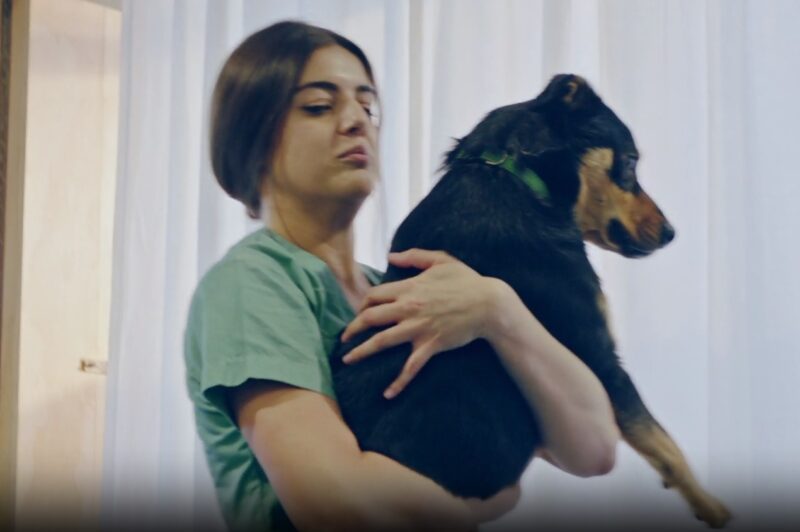
While finding undigested food in your dog’s poop can sometimes be normal, particularly with dietary changes or if they’ve eaten too quickly, there are instances when it might indicate a more serious underlying condition that requires veterinary attention. Here are some signs and circumstances when undigested food in poop, coupled with other symptoms, should prompt a visit to the vet:
- Persistent Issue: If undigested food in your dog’s poop is a recurrent problem and not just a one-time occurrence, it could suggest a chronic digestive issue that needs investigation.
- Accompanied by Other Symptoms: When undigested food in poop is accompanied by symptoms like vomiting, diarrhea, weight loss, lethargy, or a change in appetite, it could indicate digestive disorders, including malabsorption syndromes, infections, or inflammatory bowel disease.
- Change in Stool Color or Consistency: Changes in the color (e.g., very pale or black and tarry stools) or consistency (e.g., significantly looser or harder stools than usual) can indicate serious health issues, such as internal bleeding or obstructions, especially when seen with undigested food.
- Signs of Pain or Discomfort: If your dog shows signs of pain or discomfort while defecating or seems lethargic and unwell, it’s important to consult a vet, as these could be signs of more serious conditions like blockages or severe digestive upset.
- Dehydration or Other Systemic Signs: Symptoms like excessive thirst, dry gums, or sunken eyes, especially if your dog is also having diarrhea, can indicate dehydration or systemic issues that require immediate veterinary attention.
- Known Health Conditions: Dogs with known health conditions, especially those affecting the digestive system, liver, or pancreas, who start showing signs of undigested food in their poop, may be experiencing a flare-up or complication of their condition.
- Sudden Change in Diet or Unknown Ingestion: If the appearance of undigested food in poop follows a sudden change in diet or if there’s a possibility your dog has ingested something harmful (e.g., toxic substances or non-food items), veterinary consultation is crucial.
| Dietary Consideration | Guideline |
|---|---|
| Appropriate Diet | Feed a balanced diet suited to your dog’s age, size, and health status. Consult with a veterinarian or a pet nutritionist to choose the best food option. |
| Gradual Dietary Changes | When changing your dog’s diet, do so gradually over several days to allow the digestive system to adjust, reducing the risk of digestive upset. |
| Consider Digestive Supplements | Supplements such as probiotics or digestive enzymes can support digestive health. However, always consult your veterinarian before adding any supplements to your dog’s diet. |
| Limit Non-Dietary Items | Avoid allowing your dog to eat non-food items, which can be indigestible and lead to gastrointestinal blockages or upset. |
| Monitor for Food Sensitivities | Be aware of and monitor for signs of food sensitivities or allergies, such as skin irritations or gastrointestinal upset, and adjust the diet accordingly. |
| Cooked and Easily Digestible Foods | Ensure that any human foods you offer, like rice, are cooked properly and are known to be safe and easily digestible for dogs. |
FAQs
Can changing my dog’s bowl help with digestion?
Yes, using a slow feeder bowl can help slow down their eating pace, aiding digestion.
How often should I take my dog for health check-ups?
Regular, annual check-ups are recommended, but more frequent visits may be needed for specific health concerns.
Are all supplements safe for dogs?
Not all supplements are safe; always consult a vet before adding any to your dog’s diet.
Why might my dog have trouble digesting rice?
Dogs may struggle to digest rice if it’s fed in large quantities, not cooked properly, or if they have a grain sensitivity or digestive enzyme deficiency.
Can regular exercise affect my dog’s digestive health?
Yes, consistent exercise helps stimulate healthy digestion and can prevent obesity-related digestive issues.
Conclusion
Take your dog to veterinary check-ups, and choose appropriate dietary choices, and mindful feeding practices to prevent digestive issues, including the occurrence of undigested food like rice in their stool. Implement slow feeder bowls, ensure proper hydration, maintain a consistent exercise routine, and adhere to parasite prevention to achieve optimal digestive health.
When introducing new foods or dietary changes, such as rice, it’s crucial to do so gradually and ensure foods are cooked and easily digestible to avoid digestive upset. Monitor for signs of food sensitivities and consult a veterinarian before adding supplements to your dog’s diet to further ensure their dietary needs are met without compromising their health.
By taking these steps, dog owners can support their furry companions’ digestive systems, leading to happier, healthier lives together.
